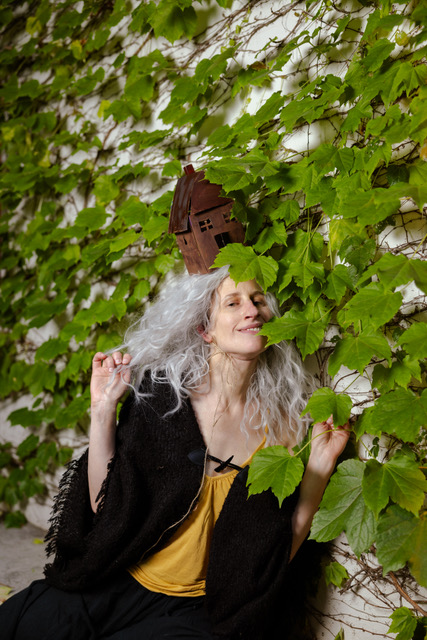The Immortal Baba Yaga

I think Baba Yaga is dope. My family’s not Russian but my parents spent 4 years in the Soviet Union for my dad’s work before I was born. I have memories of my mom talking about Baba Yaga when I was a child. And while pursuing her Masters degree in Library Science, she wrote an essay on Russian folktales that centered Baba Yaga. I still have that essay.
As I create Love you Love you Love you – a solo show about my mother’s dementia – for this September’s Philadelphia Fringe Festival, Baba Yaga is one of my north stars.
So, who is Baba Yaga? She’s a hideous old sorceress from Russian folklore who lives in a wooden hut that spins around on chicken legs. She’s got saggy boobs, iron teeth, and she might help you or kill you. Not a singular character, she’s rather a figure who appears in numerous Slavic stories – an archetype of “scary old woman” if you will. She commands respect, inspires fear, and bestows help when she feels like it. She’s been called the “ambiguous mother,” though when/if she does engender offspring it seems to happen parthenogenetically (sans fertilization). Perhaps fittingly she encompasses both male and female energy & imagery, flying around in a large mortar (yonic) and carrying a pestle (phallic).
Oh, and she eats children.
What’s not to love?
I’ve probably glommed onto my mother’s love of Baba Yaga because over the years, dementia has slowly and perniciously stolen various parts of my mother from her and from us: her judgment, memories, and sense of purpose, to name a few. Mourning is slippery – sometimes I think I’m replacing my own fading mother with this mythic old lady who, despite her age, still possesses power and lifeforce. Other times I think I’m nostalgically trying to connect to a past version of my mom – a vibrant young woman who had strong convictions and desires and perhaps wanted to see herself in this unfettered Russian witch.
Parenting the parent feels wrong and unnatural. I have moments where I’m struck by the fact that my mother has nothing else to teach me. I know that’s not completely true, but it is true that her accumulated knowledge and life history have pretty much… evanesced? Disaparated? What is left is her body (though that is diminishing), her smile, her smell, her basic her-ness, as well as her need for love, dignity, respect, and human interaction. But she doesn’t feel like my mom anymore. This is something I’ve fought against but have had to accept. Whatever part of her I used to consider mine, is no longer mine. Maybe it never was.
Parenting my son has taught me that one of the purposes of attachment is to allow for healthy detachment to occur later on. You’ve got to relinquish your own flesh and blood to the rest of the world and hope he can fend for himself. My mom let go of all the different me’s many times over. Now I suppose I need to let go of all the her’s.
As I sift through Baba Yaga stories and analyses, curious what this ancient sorceress might have to teach me about my mother and about dementia, one thing really stands out. Baba Yaga is undeniably present. She held a prominent role in Russian and Slavic folklore. She was feared, respected, beloved. She lived independently, looking after herself and all the animals in the surrounding forest. She therefore offers me – and those who once believed her to be real – a vision of an ageing woman that is not a vision of obsolescence; rather Baba Yaga is an unwieldy package of exhilaration, rapaciousness, mischief, and wit. Today, we put our old folks away and wait for them to expire. And I think Baba Yaga might have something to say about that. Not sure what it is yet, but I’m listening and willing her to possess me with the fearlessness and resourcefulness to meet my mother’s dementia – and my theatre audience – head-on.
Sarah Sanford is a Philadelphia-based actor, director, educator, and volunteer for ARTZ Philadelphia. Her solo clown show about dementia, Love you Love you Love you, will open September 20th 2024 at Cannonball Fest, the largest hub of the Philadelphia Fringe Festival. Info on the show and how to support this work can be found here.
